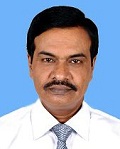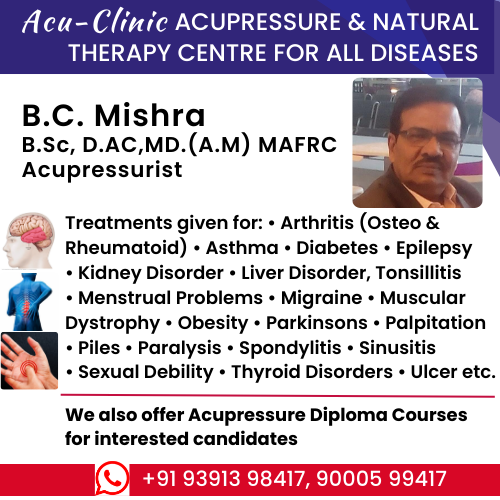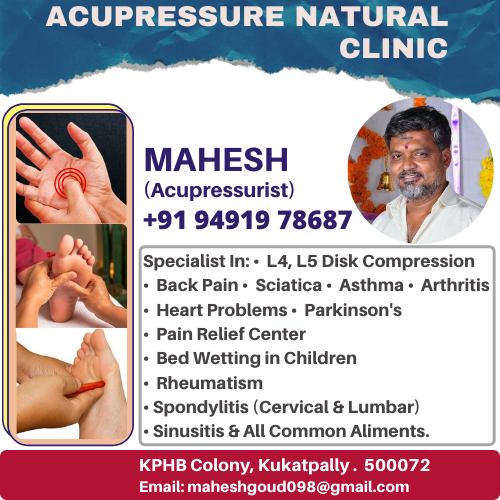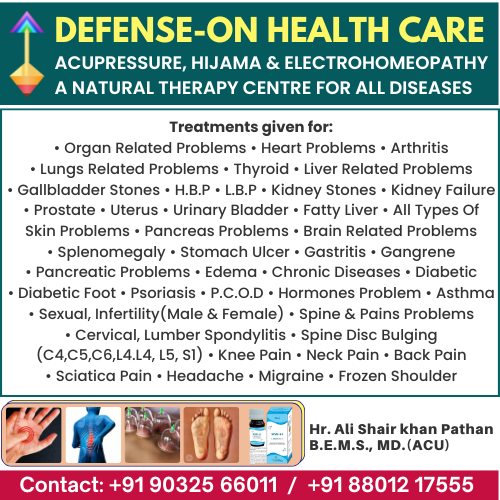wellnessexclusive.com
Your Free Guide to Good Health!

Alternative Therapies
- Alternative Medicine
- Access Bars
- Access Consciousness
- Acupressure
- Acupuncture
- Angel Healing
- Ayurveda
- Bach Flower Remedies
- Breathwork
- Cosmetic Acupuncture
- Crystal Healing
- Cupping Therapy
- Emotional Freedom Technique (EFT)
- Energy Healing
- Energy Medicine
- Ergonomics
- Family Constellation
- Face Reading
- Fengshui
- Geopathic Stress
- Graphology
- Holistic Solutions
- Holy Fire Reiki
- Homeopathy
- Ho'oponopono
- Humkara with Haleem
- Hypnotherapy
- Inner Child Therapy
- Jikiden Reiki
- Kwan Yin
- Lama Fera
- Law of Attraction
- Lecher Antenna
- Manual Therapy
- Meditation
- Melchizedek Method
- Merlin Trinity Healing
- Motivational Counseling
- Mudra Healing
- Munay - Ki Rites
- Naturopathy
- Neuro Linguistic Programming (NLP)
- Panchakarma (Ayurveda)
- Panchkarma Holistic Healing - Mind Control
- Past Life Regression
- Pendulum Dowsing
- Physiotherapy
- Pranic Healing
- Pythagorean Numerology
- Pyramids
- Reiki
- Rudraksh
- Silva Mind Control Method
- Sujok therapy
- Symphony of Possibilities
- Tarot
- Theta Healing
- Twin Flame Healing
- Unani Medicine
- Violet Flame Healing
- Vision Board
- Yoga
- Wicca
- Womb Healing
Diseases & Conditions
- Acne & Pimples
- Allergies
- Arthritis
- Asthma
- Behavioural Disorders
- Dandruff
- Diabetes
- Emotional Problems
- Gallstones
- Gastritis
- Hairloss
- Heart Diseases
- Hormonal Problems
- Hypertension
- Immune Disorders
- Infections
- Infertility
- Jaundice
- Kidney Disorders
- Liver Disorders
- Menstrual Disorders
- Migraine
- Neck & Back Pain
- Obesity
- Osteoporosis
- Peptic Ulcer
- Prevention
- Prostate Problems
- Psoriasis
- Sexual Dysfunctions
- Sinusitis
- Sleep Disorders
- Skin Diseases
- Stress
- Thyroid Disorders
- Ulcerative Colitis
- Urinary Infections
General Wellness
Prevention / Preventive Health Care in Hyderabad
Acu-Clinic -- B.C. Mishra B.sc, D.Ac., M.D(A.M),M.A.F.R.C.

Mr. Mishra is an active & renowned Acupressurist with 16 yrs experience in various types of acute & chronic diseases. He is especially known for his success in dealing with complex and challenging cases.
He is assisted by his wife Nanda Mishra to undertake the treatment of lady patients.

Acupressure Nature Clinic - K Mahesh

Acupressure Nature Clinic founded by Mr. K Mahesh is a premier place for treatment of patients with L4 L5 Disk Compression Treatment (Back pain), Cervical & Lumbar Spondylosis, Sciatica, Asthma, Arthritis, Parkinson's, Rheumatism, Bedwetting in children, Sinusitis.

Holistic health Care - Prakruti Swasthya Kendra

A Unit of Holistic Medicine Research Foundation - Asia's first and foremost ISO 9001:2008 certified pioneer research centre on Holistic Medicines - Prof. Dr. Deepak Rout (Gold Medalist)...

SGS Bio Health

Immunotherapy is an advancement natural in the field of Immune treatment which boost the body's immune system and penetrate ozone o3 molecule through body pores to fight against the Immune Diseases causing cells, at SGS Bio Health Center...

Hr. Ali Shair Khan Pathan.

Defense on Health Care - Acupressure, Hijama & Electrohomeopathy A Natural Therapy Centre for All Diseases - Hr. Ali Shair Khan Pathan.

Prevention / Preventive Health Care

Disease prevention is a branch of medicine which focuses on the prevention of disease, both in individuals and communities. A number of branches of science and medicine are intertwined in this medical discipline, ranging from anthropology to study cultural practices which could promote the spread of disease to epidemiology, the identification and study of disease. Many nations have a disease prevention program in their national health framework, because disease prevention benefits society as a whole.
Humans have been struggling with disease for thousands of years, and the problem only became more pronounced when people began living in closely crowded areas. As cities grew, so did the diversity of disease, along with a variety of colorful attempts at disease prevention. Not until the 1800s did people really begin to understand the process of disease, and start to take steps to prevent the spread of disease and to promote healthy communities, ranging from washing hands between patients to pasteurizing dairy.
Different nations have reached different levels in their disease prevention strategies. In developed countries, for example, basic steps like sanitizing drinking water, providing clean living conditions, and using widespread vaccination programs have proved to be very effective at preventing disease in community at large, and doctors can focus on individual patients. In the developing world, however, medical professionals are still struggling with the basic rudiments of disease prevention, ranging from encouraging the modification of cultural values to reduce the spread of disease to attempting to provide basic medical care. In communities, disease prevention is usually focused on providing clean living conditions and promoting education so that people understand the mechanisms of disease. Sewer systems, water purification plants, health codes, and the establishment of sterile hospital facilities are all examples of infrastructure which is designed to prevent disease. Many nations also have community education programs such as HIV/AIDS education which tell citizens about how diseases spread. This two-pronged approach reduces the risk of disease by eliminating conditions in which it can thrive.
For individuals, disease prevention can include the use of vaccination and prophylactic medications, and the identification of risk factors which could make someone more prone to disease. General wellness may also be promoted, as healthy individuals with strong bodies are less likely to contract disease.
Disease prevention also includes work in scientific institutions and laboratories. Scientists work to identify diseases and to learn more about how they are transmitted and how they can be treated and prevented. The development of things like diagnostic screenings for early signs of cancer has been a major part of disease prevention around the world, as has the focus on identifying at-risk individuals and reaching out to them.






